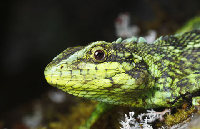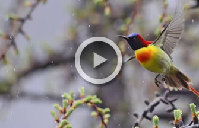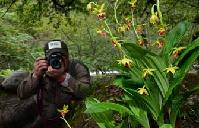Trapped in paradise
Visiting a treasure trove of biodiversity with a group of excellent naturalists? Who would say no to such an opportunity?
The destination is Dulongjiang, one of the most remote parts of Yunnan province, which is known for its terrible road conditions.
|
|
|
|
|
|
Although a highway has connected the township inhabited by the Derung ethnic group, the country's smallest, with the county seat of Gongshan since 1999, it is cut off every year between October and April because of heavy snow. Even in accessible months, the road might be closed for a day or even weeks because of sudden landslides caused by rains. As a result, Imaging Biodiversity Expedition Inc's first Dulongjiang survey failed to even reach the river valleys in August 2013.
"If things go against our plan, we can still count on logistical support from the forestry bureau (of Nujiang prefecture)," Dong Lei, one of 13 participants in the expedition, who I have known for many years, told me. His words turned out to be prophetic.
We arrived in Qinlangdang village on the afternoon of May 8-my fourth day in Yunnan, we were cut off from the outside world by landslides triggered by continuous rains.
Over the next eight days, we felt lucky that our team had local partners. We were able to stay in two thatched cottages, the village's only guesthouse, recharge our computer and camera batteries at a villager's family-owned hydraulic power generator and purchase food from the villagers.
We consumed a pig, eight chickens, three fish from the Dulong River and a whole basket of bamboo shoots during our stay. "If we stay any longer, we might finish the village's livestock," a participant in the survey joked.
Although we had no electricity or mobile phone signals, which were cut off on the second day we were in the hamlet, the days at Qinlangdang were full of excitement and discoveries.
The IBE team consisted of a botanist, a researcher of amphibians and reptiles, three insect micro photographers and three wildlife photographers. Venturing into the wild with any of them meant getting a glimpse of a different side of the amazing world of nature.
A tree frog that might never have been documented by scientists before seems to be common sight in some parts of these forests. I was told that a tiger butterfly I photographed on the dirt road had probably "never been photographed before in the country". Interesting insects and bugs were found almost every day.
Nearly 100 species of birds were photographed around the village.
You soon become aware of how distinctive and valuable the ecosystem is and feel an obligation to let more people know of its importance so as to keep it intact, forever.
Threats to the area are certainly from the outside. As we were walking out of Qinlangdang, I met three visitors. They were employees of a logging company based in Lincang prefecture, in the deep south of Yunnan. They came to Qinlangdang for an on-the-ground investigation of the area's "investment environment" and a meeting with representatives from Myanmar on the other side of the border for "possible cooperation". They walked in and had to walk out. They found no guest rooms, which were occupied by us, to spend the night.
The good news is that they found that the investment environment was "horrible" and the cost of cooperation with the Myanmar side would be "too high to be practical". They will suggest their company back off.
In this instance, the landslides don't seem all that bad.



















